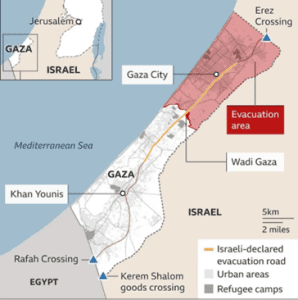TAG: GS 2: INTERNATIONAL RELATIONS
THE CONTEXT: The recent agreement between Israel and the United States to facilitate aid delivery to Gaza marks a significant development amidst mounting pressure from humanitarian agencies and the Biden administration.
EXPLANATION:
- This agreement comes in the wake of concerns over the dire humanitarian crisis in Gaza, including warnings of an impending famine.
- The following analysis delves into the details of this agreement, the factors leading to it, and its implications.
Background:
- Gaza has been facing severe humanitarian challenges exacerbated by ongoing conflict and restrictions on aid.
- Humanitarian agencies and the United Nations have repeatedly raised alarms about the looming famine and urgent need for increased aid delivery.
- The Biden administration has voiced growing concerns over civilian casualties and the humanitarian situation in Gaza.
Key Developments:
- Israel’s Agreement to Open Erez Crossing:
- Israel has agreed to open the Erez crossing to allow aid into northern Gaza, following pressure from the United States.
- The Erez crossing, previously closed since an attack by Hamas on October 7, will now permit temporary aid delivery.
- Additionally, Israel will utilize the port of Ashdod to direct aid into Gaza and increase aid deliveries from Jordan.
- Biden Administration’s Involvement:
- S. President intervened directly, expressing frustration during a tense phone call with Prime Minister Benjamin Netanyahu.
- Biden threatened to condition future support for Israel based on its response to humanitarian concerns and civilian casualties.
- Escalating Criticism and Pressures:
- Israel faced mounting criticism from the U.S. and humanitarian agencies, particularly after the killing of seven aid workers by Israeli forces.
- The Biden administration signaled a shift by leveraging American aid to influence Israel’s conduct in the conflict with Hamas.
Implications:
- Humanitarian Relief: The agreement holds promise for increased aid delivery, particularly to the critically affected northern Gaza.
- Political Dynamics: Biden’s approach signifies a departure from traditional U.S. support for Israel, indicating a willingness to exert pressure on key allies for humanitarian reasons.
- Israel-U.S. Relations: The agreement underscores the complex relationship between Israel and the U.S., with Biden’s administration taking a more assertive stance on issues of humanitarian concern.
Challenges Ahead:
- Implementation: The effectiveness of the agreement hinges on the timely and complete implementation of promised measures by Israel.
- Long-term Solutions: Addressing the root causes of the humanitarian crisis in Gaza will require sustained efforts beyond short-term aid delivery.
Erez Crossing:
- Location: Northern end of the Gaza Strip, between the Israeli kibbutz of Erez and the Palestinian town of Beit Hanoun
- Function: Sole pedestrian crossing point between the Gaza Strip and Israel, used primarily in exceptional humanitarian cases
- Other Name: Beit Hanoun Crossing
- Managed by: Israel Defense Forces
- Capacity: Modern terminal with an area of 35,000 m² and a capacity of handling 45,000 people per day, completed in 2007
- Historical Context: Part of a complex that included the Erez Industrial Park; previously facilitated by a railway line connecting Israel and Gaza
- Connects: Israel’s Highway 4 with Gaza’s Salah al-Din Road

Erez Crossing
Spread the Word
